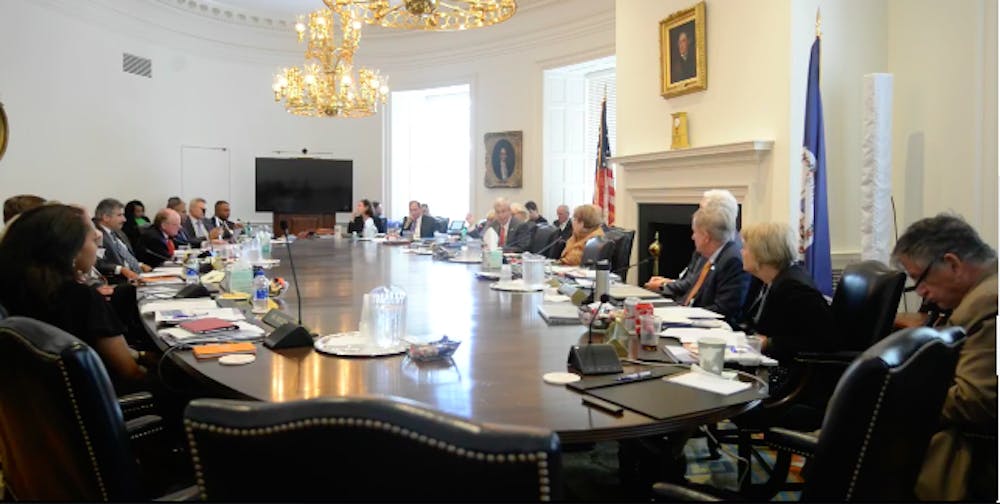The University’s Board of Visitors voted Friday to remove the Confederate plaques erected in 1903 on the Rotunda. The resolution called for the plaques to be moved to a location at the University where they can be viewed as artifacts.
The Board also passed resolutions to designate the Academical Village as a facility and to enforce the University’s open flame policy. Under both of the resolutions, the University can enforce the University policy of prohibiting open flames without a permit on the Lawn.
The discussion regarding the two resolutions on the Lawn designation and open flame policy was short and quickly passed unanimously.
The moves follows a white nationalist torchlit march through Grounds on Aug. 11 that came to a violent end at the statue of Thomas Jefferson north of the Rotunda.
The room grew solemn as Rector Frank M. Conner III began discussions on the removal of the Confederate plaques from the Rotunda. However, he said the plaques keep students and faculty of color and underrepresented minorities from feeling comfortable on Grounds.
“We need to have talent, not just in terms of students, but talent in terms of faculty,” Conner said. “[We have to ask] are those plaques a barrier to the talent that we want today in terms of students and faculty? And it is.”
The resolution was spurred by the a list of 10 demands championed by the Black Student Alliance and numerous other student groups, one of which called for the removal of the plaques on the Rotunda. Thursday, the Board fulfilled another one of the demands — recognizing a 1921 donation to the University from the Ku Klux Klan — by reinvesting the amount adjusted for inflation towards helping the victims of the violent Aug. 12 “Unite the Right” rally.
Following the vote, Board member Thomas DePasquale said the Board needed to be careful with how they treated the plaques because he said the Confederate soldiers were also American soldiers fighting for their country. However, Board member Barbara Fried said the plaques show an incomplete story of the Civil War.
“I don’t think we’re trashing the dead. The fact that no Union soldiers were placed on those plaques says it all,” Fried said. “It’s not 1903, it’s not 1924, it’s 2017. I don’t really want to refight the Civil War.”
Board member Maurice Jones also said the soldiers commemorated on the plaques fought for the Confederacy, not the United States.
“These were not young men dying for America. They were dying for the Confederacy,” Jones said. “And if they had won, I would not be here with you today.”
Following Jones’s comments, Conner closed the discussion on the subject of the Confederate plaques to avoid it becoming “irreconcilable.”
Bryanna Miller, the student representative to the Board and a fourth-year College student, later became emotional as she thanked the the Board for allowing her to be in the first class of University students who would not have to “walk past those symbols that have been bearing down on [her] since the reopening of the Rotunda.”
Miller also said she met with a group of students of differing political perspectives at the Thomas Jefferson statue on the north side of the Rotunda Wednesday night. She said the group devised a paragraph they all agreed upon to contextualize the Jefferson statue.
“I believe in the power of dialogue,” Miller said. “I believe in the moral authority of this institution.”







